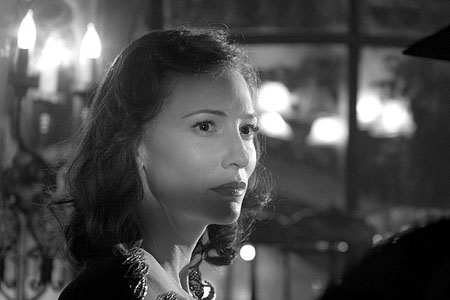“We’ll always have Berlin.”

Steven Soderbergh is one of those directors who believes in doing new and exciting things in film, like releasing the same film simultaneously on DVD, the internet and in cinemas and seeing which one no one will see the least.
The exciting thing he had in mind for The Good German was to make it exactly the same way that a movie would be made in the forties: cinematography, sound and set design like the greats. Apparently his contract stipulated that in order to make The Good German he had to append the end of Casablanca to it.
Clearly he had mixed success.
Jacob Geisman (George Clooney), a US War Correspondent, flies into Berlin to attend the Potsdam Conference. His driver, Tully (Tobey Maguire), “coincidentally” happens to be keeping Lena Brandt (Cate Blanchett).
When Tully catches wind of the fact that the Russians and Americans both want Lena’s allegedly deceased husband, he tries to broker a deal. Geisman has to pick up the pieces and try to understand Lena’s motives.
This was one of Blanchett's three projects of 2006, the other two being Babel and Notes on a Scandal. In each of these movies she affects a different accent: American, British and 1940s German. It's not an exaggeration to say that Blanchett is the highlight of the film, as she is clearly the best thing about most of the movies that she makes. You have to pit her against someone like Judi Dench for her to have any competition at all.
Lena is prime ambiguous femme fatale material, never quite letting on precisely what she knows and what she wants until the end. When she does, the film reaches an anti-climax in the way that only olde worlde stories can. If you have to have the words "The End†flash on the screen, then you're not quite getting it right.
I'm not going to pretend to even begin to understand Soderbergh, who makes movies like Ocean's 11, 12 and 13 so that he can make vanity projects like this. Of course, if you'd seen one of the Ocean movies you could very easily tell that they, too, are vanity projects. Soderbergh must be in some sort of Hollywood heaven, which will never realise he is flying too damn close to the sun.
There is some sort of wrong-headedness at play in his style, anyway, because his inconsistent use of voice over doesn't make a lot of sense and his application of Tobey Maguire to one of the three major roles of the film is a freakish misjudgement. I was glad when Maguire got himself written out, simply so I wouldn't have to listen to him being misogynistic, violent and throwing around cusses like they were going out of fashion.
Which is another thing: for a film that's made in the style of the forties, there's a heckfire of a lot of cursing going on. The script even goes so far as to include the "c wordâ€, which is still taboo in 2007.* All of this swearing going on is probably the only reason that the film has received an MA rating in Australia; it otherwise features very little in the way of violence, a fairly chaste sex scene and a bare minimum of nipples (two). This is a problem as The Good German is the sort of film that my grandparents would like to see, but they would be turned off by the near endless profanity.
George Clooney's Geisman is physically weak and constantly endangering himself for emotions that can't really be justified. Lena is deliberately distant and, while compelling to an audience, one is hard pressed to see what a US serviceman would see in her (beyond the obvious: that she's Cate Blanchett). Geisman spends the movie chasing a trail of clues that aren't quite compelling enough to really be intrigued by. The movie consistently engaged me but I wasn't that invested in the outcome; I've read that most people who like the movie praise it almost solely for the techniques engaged; I'd buy that.
The most intriguing aspect of the story, that of the ethical implications of hiring war criminals to work for the governments that were once their enemies, is barely touched upon. I browsed through the book to see how it ended, and it had a much more ambiguous and meaningful suggestion about the themes that are supposed to have haunted the filmic version of this story but never quite did.
Somewhere between Van Sant's slavish remake of Psycho and the more avant garde work of Soderbergh, several directors have become so enamoured of film's form that they have forgotten its substance. The characters have the foundations upon which Soderbergh could have built a greater interest, but he was too focused on the framing of the camera. If you remember how a film is made, but you can't remember what should be in a film, you don't really have the right to be directing them. The Good German is technically arresting, certainly, but it's little more than a passing fancy.
*Unless, apparently, you're speaking about Ann Coulter.
